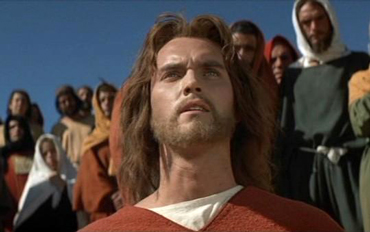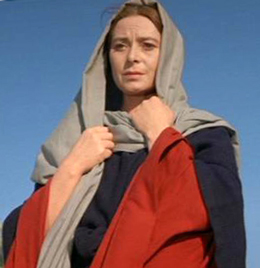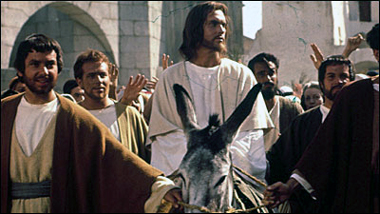
 |
|
|
|
King of Kings is Samuel Bronston's first superproduction of the 1960s. The fact that it was the producer's least problematical show only means that outrageous political and artistic disasters weren't happening on the set every day, as with his later efforts. Originated by John Farrow, the director of Bronston's John Paul Jones, King of Kings is a rickety independent financed in equal measure by the producer's contacts with a Dupont heir, the Fascist Franco government and international investment voodoo. That the Spain-filmed movie turned out as perhaps the best of the big-budget epics about the life of Christ is due to the input of director Nicholas Ray, writer Philip Yordan and plain good luck. 
The movie is a straightforward biography with all of the expected highlights. The difference is in the execution, and this is what I think makes King of Kings stand out. Philip Yordan's script takes rather radical liberties with Bible accounts in order to elevate the role of Barabbas (Harry Guardino) from a thief to a rebel fighter for the Hebrew cause. The always mysterious figure of Judas (Rip Torn) is given a new motivation -- he initially sees the joining of Jesus and Barabbas as a powerful alliance against the Roman occupation. But Judas comes to doubt that Jesus' peaceful philosophy has immediate political aims. The final film has Barabbas attempt a revolt on Palm Sunday, using Jesus' entrance into the city as cover. Judas foolishly thinks that this attack will force Jesus to use his miraculous powers to aid the rebels. It's rather easy to see that Yordan is incorporating the modern liberation of Israel into the storyline, acknowledging that faith and politics (and war and killing) were just as sticky 2,000 years ago as they are now. Director Ray is in masterful control of his visuals in all the dramatic scenes. 1 The scenes of Jesus' birth and early life, with Mary (Siobhan McKenna) knowing that he'll eventually be called to some purpose, are filmed simply and without undue emphasis -- the tone is reverent but people don't walk around as if they can hear heavenly choirs. Where recognizable actors are used, the casting is generally excellent. Hurd Hatfield plays Pilate at a regal distance, refusing to become engaged in the "Jesus hysteria" that has infected his own wife, Claudia (Viveca Lindfors). Lucius, the Centurion (Ron Randell) is a professional soldier and an honest man ... his character arc isn't from pagan to believer, but from a noncommital position to a somewhat enlightened form of humanism. Over in Herod's palace things aren't quite so interesting. Frank Thring's Herod Antipas is an obvious degenerate, while Brigid Bazlen is a singularly uninspiring Salome. Rita Gam of (Saadia) strikes a much more credible note of depravity. Director Ray uses extreme angles for dramatic scenes showing Herod murdering his way to the throne, getting good mileage from the beautiful inlaid floors on the Spanish set. 
Ray gets really down to basics with his group of apostles, who come across as ordinary men inspired to drop their day jobs and follow someone who simply "has a better idea." Ray enlisted actor's actor Royal Dano to play Peter the fisherman, and Dano was given the job of getting the other apostles, some of whom are Spanish actors, into shape. When they gather to hear Jesus talk, and even at The Last Supper, Ray plays these men not as apprentice saints but as rootless drifters united by a Glorious Idea. When he denies Jesus, Peter is just a sad guy too scared to put his neck on the line, no more and no less. Nicholas Ray's personal motto was "I'm a stranger here myself", a phrase that Jesus might have said. King of Kings drew a lot of heat for its depiction of Jesus as young, blue-eyed and blonde, and sarcastic critics dubbed the movie I Was a Teenage Christ. I've seen Jesus played by old and young men and the vogue now is to picture him as a gaunt fellow with haunted eyes: James Caviezel or Willem Dafoe. Nicholas Ray was intrigued by Max von Sydow, but couldn't get him; John Ford suggested Jeffrey Hunter to Samuel Bronston. I personally have no problem with Hunter because he is the Jesus I saw in Sunday school, the spitting image of those little postcards and illustrations. What's important is what Nicholas Ray does with the character, and the way he is filmed. Hunter plays Jesus straight and exceedingly gentle when not routing the moneylenders from the temple. He's by no means an ordinary man, as he speaks his sermons and recites his parables not as if he's inventing them, but conveying them from a higher power. His sermon on the mount has gravity because he's simply preaching, hoping his words will connect with the multitudes. It's beautifully done. Ray is very standoffish with the miracles. When Jesus restores a man's sight and cures a cripple, we only see his shadow. This keeps him from appearing to be a mere magician or faith healer -- Ray's compositions and the music insinuate that God's power is at work. Ray shows Pilate and Herod attempting to pass the buck on condeming Jesus at his trials, and then plays the crucifixion simply as well. The scene makes its points, but is not drawn out to emphasize Jesus' suffering, or to feature "special guest empathy" from chosen stars. We instead get the eerie spectacle of Jesus being sighted just before his ascendance, spotted as if he were a benign alien about to return to outer space. The restraint shown in these few final scenes pays off in some very moving emotions. 
Although his part is small, for me the most touching moments in King of Kings are with Robert Ryan as John The Baptist. Ryan's mid-day squint is interrupted for a second when he first econunters Jesus in the river, recognizing him as the Expected One. To their credit, Ray and Yordan don't force John to provoke Salome in any personal way. The prophet's sorry fate would seem to be a foregone conclusion -- this is how ragged preachers who insult the king end up, and John is making a very conscious choice. But when Jesus appears at John's dungeon window the movie momentarily kicks into a higher level of emotion. Robert Ryan's devotion is so total, to see him crawl and scrape his way up the tilted stones with such a look of joy on his face ... it's very affecting. I suppose it comes from seeing so many shallow films where the Ryan is miscast or poorly used. The production of King of Kings was a Master's Course in power politics. Nicholas Ray brought Philip Yordan on the picture, but because of the strange vacuum of leadership at the center of the production, the writer soon promoted himself. He eventually became a sub-producer, one among several that found clever ways to siphon money from the production as fast as Bronston could bring it in. A hustler from way back, it was Yordan who determined that Cecil B. DeMille had never registered the title of his silent The King of Kings, which was still playing occasional engagements in the Midwest and South up to the early 1950s. So for a six-cent postage stamp Yordan saved Bronston 10% of his profits. MGM's influence on the picture grew when Bronston had to tap the studio for more money. At MGM's bidding Yordan and Ray found themselves adding more action scenes and eventually an hour's worth of material with a new character played by actor Richard Johnson. Cooler heads prevailed and this elaborate subplot was eventually dropped.Ray Bradbury came on the show uncredited to write passages of voiceover that were eventually recorded by Orson Welles, also uncredited. Bradbury ended up contributing his poetic touch to a few scenes, as when Barabbas says, "I am fire and he is water, how can we ever meet?" The original script called for a rather dull ending, and Bradbury was pressed to contribute a better one. He proposed an ethereal image of Jesus walking in a heat mirage on the desert, followed by shots of his wind-blown footsteps. As that illusion was considered too difficult to film, Ray and others instead settled on the film's deceptively simple, inspiring final image of the enormous shadow on the beach. Although previously dropped from the film, Ray was on good enough terms with MGM to come back to Culver City to do a new scene where Mary meets Mary Magdalene (Carmen Sevilla) ... another delicate encounter deepend by Ray's sensitive touch with actors. 
King of Kings was a critical punching bag but a popular Road Show attraction. Nobody seemed too bothered by the film's making Barabbas into a freedom fighter, and the overall response was so favorable that Nicholas Ray and Philip Yordan were brought back at exhorbitant salaries to prepare 55 Days at Peking, while Bronston's next picture El Cid was shooting. Warner Home Video's Blu-ray of King of Kings presents a fine HD transfer of this 70mm Road Show release, oriignally filmed in Super Technirama 70. 2 Color values and sharpness are excellent. King of Kings doesn't try to slay the viewer with a new special effect every five minutes, so the little things make a bigger impact. A Roman officer breaks into a sacred corner of the Temple by slicing through a fine, semi-transparent scrim-like cloth. A sudden close-up of Jeffrey Hunter's enormous blue eyes is almost overpowering. King of Kings has a fine score by Miklos Rozsa that captures a feeling of high emotion, but otherwise doesn't "Mickey Mouse" events too closely. The disc comes complete with overture, intermission and exit music. Warners doesn't have a big list of extras for the disc. An original featurette shows preparations for the Sermon on the Mount, and a newsreel covers the film's big premieres. An original trailer announces the film as yet another towering achievement for our time. My only comment about the sales job given the film is the main poster artwork that uses giant stone letters. The design is almost identical to key artwork for William Wyler's Ben-Hur.
Research sources:
On a scale of Excellent, Good, Fair, and Poor,
King of Kings Blu-ray rates:
Footnotes:
1. It's always unwise on a movie like this to assume that Ray, even though he worked out plans for the second units, is wholly responsible for everything in the picture. Reshoots took place after he left the production. MGM even put in their designated directorial pitch-hitter Charles Walters for a few days.
2. Any Kindergartner will tell you what Super Technirama 70 is: ordinary Vistavision (35mm film running sideways, large image area) squeezed slightly so as to stretch out to anamorphic widescreen aspect ratios (the Technirama part) and then blown up to 70mm for exhibition. Try it next weekend. 3. A note from colleague Richard A. Smith, 3.30.11: Glenn: Well, your review did the trick: I thought I was the only person alive who liked King of Kings. I first saw the film in it's original release (in 70 mm) at the Warner Theater in DC. The Warner - one of Washington's impressive Movie Palaces (and the only one still remaining, although as a legit house) had recently been converted from a 3-panel Cinerama house; so, the film was projected on the giant, curved, louvered Cinerama screen. Wow! Impressive! I saw the rest of Mr. Bronston's epics on the same screen. Years later, I saw the film in a 16 mm pan-and-scan version. Not-so-wow, and not-so-impressive. The story and acting mostly held up; but, something was missing: Like most of the scenery. It was during this screening that I noticed an obvious "oops" in the opening sequence. One of the Roman Soldiers' (lower screen, far left) is carrying an elaborate gold - not sure what to call it - that emerges from behind/under the matte painting. It should also be mentioned that the film's box-office was affected by a Catholic League of Decency ruling that it was sacrilege for a mortal to play Jesus Christ. Most films prior to King of Kings (example Ben-Hur) avoided showing Jesus' face. The LOD placed the film in their " 'separate classification' which was described as 'given to certain films which, while not morally offensive, require some analysis and explanation as a protection to the uninformed against wrong interpretations and false conclusions.' Presumably the reader would know whether she or he were uninformed and needed 'protection.' " It has always been assumed that this role killed Jeffrey Hunter's acting career. Hope all is well. -- RAS
Reviews on the Savant main site have additional credits information and are often updated and annotated with reader input and graphics. Also, don't forget the 2010 Savant Wish List. T'was Ever Thus.
Review Staff | About DVD Talk | Newsletter Subscribe | Join DVD Talk Forum |
| ||||||||||||||||||